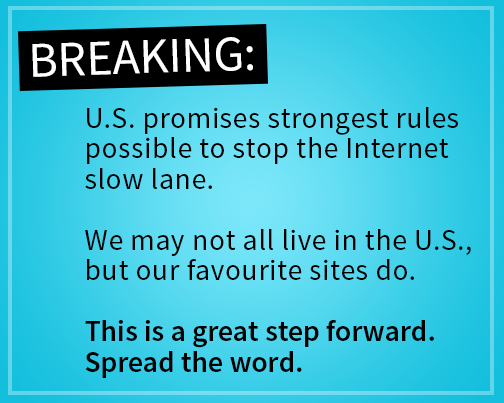How Canada’s net neutrality rules are some of the best in the world
This article by our Josh Tabish was originally published on the Huffington Post. Yesterday, U.S. FCC Chairman Tom Wheeler announced his agency’s commitment to the strongest possible rules to prevent telecommunications companies from forcing certain websites and services into a slow lane online. At issue here are so-called “net neutrality” rules – rules which dictate whether our online networks are a level playing field (or “neutral”), and how companies that sell Internet access are allowed to treat content.
Chairman Wheeler, a former telecom lobbyist, put forward his vision in an op-ed published by Wired Wednesday morning. The screaming headline is that Wheeler publicly committed to using Title II reclassification to ensure net neutrality south of the border.
In layman’s terms, this means he’s committed to the strongest possible legal foundation for net neutrality – a policy position that is radically different from where he stood on the issue just over a year ago, and no doubt the result of pressure from a broad net neutrality coalition including OpenMedia.
However, it’s crucial to remember that we haven’t seen the actual rules just yet.
But based on Wheeler’s comments, here’s what we know: The FCC is committed to rules that prevent website blocking, slow lanes (AKA: paid prioritization), and traffic throttling. They will also strive to apply the same rules to both mobile and wired Internet. On the face of it, this looks like a huge win for Internet users. But as we know, the devil is in the details, and we reserve final judgement until the full rules are released later this month.
While our neighbours south of the border have much to celebrate, Canadians have reasons of their own to be glad. For years now, Canada has been home to some of the strongest net neutrality rules in the world. Canada’s rules, known amongst policy wonks as Internet traffic management practices (ITMP) rules, have been used to prevent website blocking and slow lanes when they’ve occurred, and promote transparency around how our telecom providers manage their networks.
These rules came into effect in 2009 because Canadians fought for them and won. The OpenMedia-led SaveOurNet coalition took the voices of hundreds of businesses, public interest groups, and tens of thousands of Internet users, to the CRTC to prevent telecom giants from restricting our access to online services. Similarly, today’s announcement comes after a sustained year-long campaign led by a huge coalition in the U.S. to make the FCC do the same.
In Canada, this has provided Canadian businesses, Internet users, and public institutions with a strong sense that in Canada, the Internet is a level playing field promoting innovation and creativity. This is why we’ve had innovators like Shopify, Tucows, Hootsuite, and millions of content creators across the country feel empowered to make global contributions towards how we share, collaborate, and do business online.
And while the rules weren’t perfect when they first came out of the oven, decision-makers in government and the CRTC have since taken bold steps to improve them.
Most recently, we saw the CRTC receive new powers to levy significant financial penalties on telecom providers that break the rules, and ensured net neutrality protection across our wireless networks in the face of new uncompetitive practices from mobile providers. In fact, when OpenMedia presented before the CRTC this past December, Chairman Jean-Pierre Blais announced that a new monitoring program was en route for 2015 to ensure these giants are keeping their word and keeping our Internet a level playing field. Details on this remain to be seen.
While this announcement is cause for celebration among Americans in particular, and means that Canadians’ own net neutrality wins are at lesser risk of dilution from proximity to our southern neighbour, this announcement is a gigantic step forward for Internet users around the world.
Not only will the FCC’s decision impact the 312 million inhabitants of the United States, it also impacts millions and millions more beyond its borders.
Think about it: you may not live in the U.S., but many of your favorite websites do. In the end, rules that impact those sites will eventually impact you. And as countries around the world continue to contemplate net neutrality rules, it will be important to show the leadership of Canada’s CRTC, the United States’ FCC, and others to urge policy-makers around the globe to follow suit.



 Take action now!
Take action now!
 Sign up to be in the loop
Sign up to be in the loop
 Donate to support our work
Donate to support our work